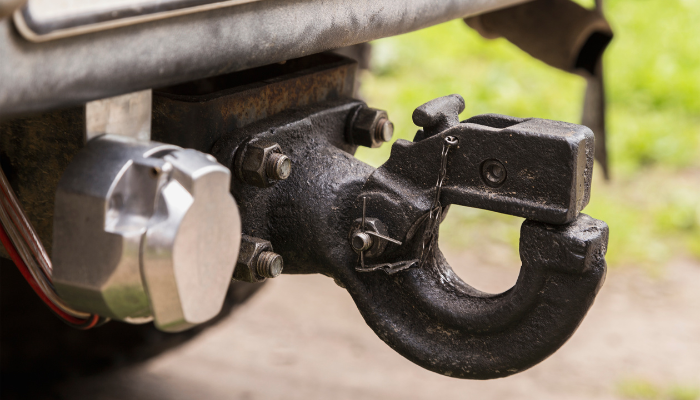This post may contain affiliate links which means I may receive a small commission for purchases made through the links. Learn More
Trailer hitches are an essential component when towing a trailer. They provide great help in connecting your vehicle and the trailer and are responsible for ensuring that the trailer stays in line and is stable when you drive the vehicle.
But do you know that there are many different types of hitches available in the market? Many people, especially newbies get confused when it comes to choosing the right hitch due to the number of types. Each hitch type has its own set of advantages and disadvantages.
In today’s guide, I’ll guide you about different types of trailer hitches and their classes. So, stay connected so you don’t miss any information. Having proper information about different types of hitches and their classes will help you make an informed decision.
Related Article: Andersen Weight Distribution Hitch Problem & their Solution
Types of Trailer Hitches
When it comes to trailer hitches, there are several different types to choose from. You will have to keep in mind that each type is designed to meet specific needs and is used for different types of trailers. The usability and purposes vary from hitch to hitch. In the section given below, I’ll explain different types.
1- Ball and Hitch Receiver
The most common type of hitch is the ball and hitch receiver. These types of hitches usually consist of a ball and socket joint to connect the hitch to the trailer. You might be thinking how these ball and hitch receivers can tow the trailer.
Actually, for towing a trailer, the ball is attached to the vehicle, and the receiver is attached to the trailer. Once you’ve attached the ball and receiver, then you’ll be good to go. You can use this hitch to tow small to medium-sized trailers.
2- Weight-Carrying Hitches
Weight-carrying hitches are usually good for supporting the weight of the trailer and are typically used for small to medium-sized trailers. One thing that I love about these hitches is that they are really easy to install. You won’t need to be an expert to use them.
3- Weight-Distributing Hitches
Weight-distributing hitches are probably the most used hitch as they do wonders for the work. By using these types of hitches, you can distribute the weight of the trailer evenly across the vehicle’s axles. Most truck drivers prefer using them when they tow larger trailers with their vehicles.
4- Fifth Wheel Hitches
On this website, probably fifth-wheel hitches are the most discussed as I’ve written many blog posts on them like how to install them on different trucks. But trust me or not, the fifth-wheel hitches are just perfect in giving you stability when you tow heavy trailers or overloaded trailers.
They are designed for use with larger trailers, such as RVs and horse trailers. These hitches are typically installed in the bed of a pickup truck or flatbed truck. You will have to use a kingpin to connect the hitch to the trailer.
5- Bumper Pull Hitches
Bumper pull hitches are a type of towing hitch that is attached to the rear bumper of a vehicle. The good thing that I like about the bumper pull hitches is that they are really inexpensive and everyone can afford them.
They are used to tow small-sized trailers, such as a pop-up camper, a utility trailer, or a small boat, behind a passenger car, truck, or SUV. Bumper pull hitches are relatively simple and you will be able to use them even if you don’t have much technical knowledge.
6- Pintle Hitches
Pintle hitches are made for towing heavy-duty trailers, such as construction equipment and military vehicles. These hitches consist of a pivoting ball-and-socket joint mounted on a trailer and a mating hook on the tow vehicle.
One thing I can assure you is that with these pintle hitches you will get a more secure connection than traditional ball-and-socket hitches. The reason is that the hook prevents the trailer from getting unhitched even if the hitch ball comes loose.
So, these were some common types of hitches that you’ll see in the market. While explaining to them, I told you about how they work and their capabilities. My aim was to give you in-depth so that you don’t feel confused when making a buying decision.
Trailer Hitch Classes
Look, Different hitches can handle different amounts of weight when towing a trailer. If one hitch can help you tow a trailer weight 1500 pounds, then another hitch can help you tow a trailer weight more than 3000 pounds. How would you categorize these hitches as they have their own limits?
So, another system of classes was introduced. The trailer hitch classes system is a way of categorizing the weight capacity and towing capacity of different hitches. There are five different classes that I will be explaining in the below section.
1- Class I Hitches
Class I hitches are not very powerful and they are good to tow smaller-sized trailers. They have a weight capacity of 2,000 pounds. You can use class I hitch to tow small utility trailers, boat trailers, cargo trays, and small campers.
Tongue Weight: The Class I hitches have a tongue weight of 200 pounds. If you don’t have much knowledge, it is the weight of the trailer that comes to the hitch. It is around 10 to 15 percent of the total weight of the trailer that you are towing the hitch.
2- Class II Hitches
Class II hitches are slightly more powerful than class I and you’ll be able to tow mid-sized trailers with ease. Their weight capacity is 3,500 pounds. These hitches have a tongue weight of around 350 pounds.
3- Class III Hitches
Class III hitches are good for use with larger trailers. These hitches have a weight capacity of 5,000 pounds. I recommend using these hitches for towing the fifth-wheel trailers as their weight capacity is decent and you won’t feel disappointed. The tongue weight of these Class III hitches is around 550 pounds.
4- Class IV Hitches
Class IV hitches are perfect for towing heavy-duty trailers. These hitches have a weight capacity of 10,000 pounds. These hitches will be good for towing full-size pickup trucks and commercial vehicles. They have a tongue weight of 1000 pounds.
5- Class V Hitches
Class V hitches are the largest and most heavy-duty hitches available. You won’t get anything powerful, they are ultimate and are the strongest. They have a weight capacity of 12,000 pounds and you will be able to tow almost all types of heavy trailers. In these hitches, the tongue weight would be around 1200 to 1700 pounds.
Conclusion
There are many different types of hitches available in the market and you can use them for different purposes. One thing that you should keep in mind is that every hitch type has its own specification, method of installation, and weight capacity. So, you should not mix them; instead, choose the one that fits your needs. I hope this guide will add value to your life.

I’m Ahmad – the owner of this website and the writer of this post. I’ve spent 15 years in the automotive industry, especially among the hitches. What you’re reading is the experience of my 15 years.

